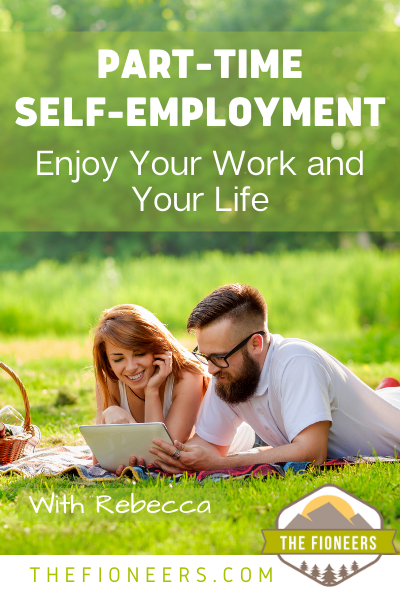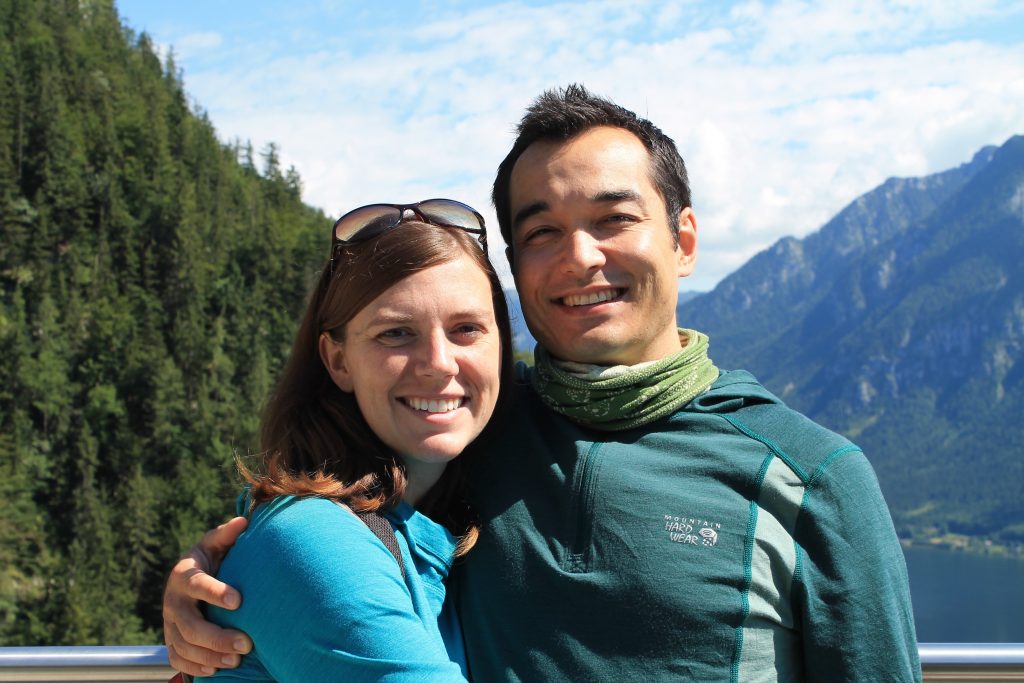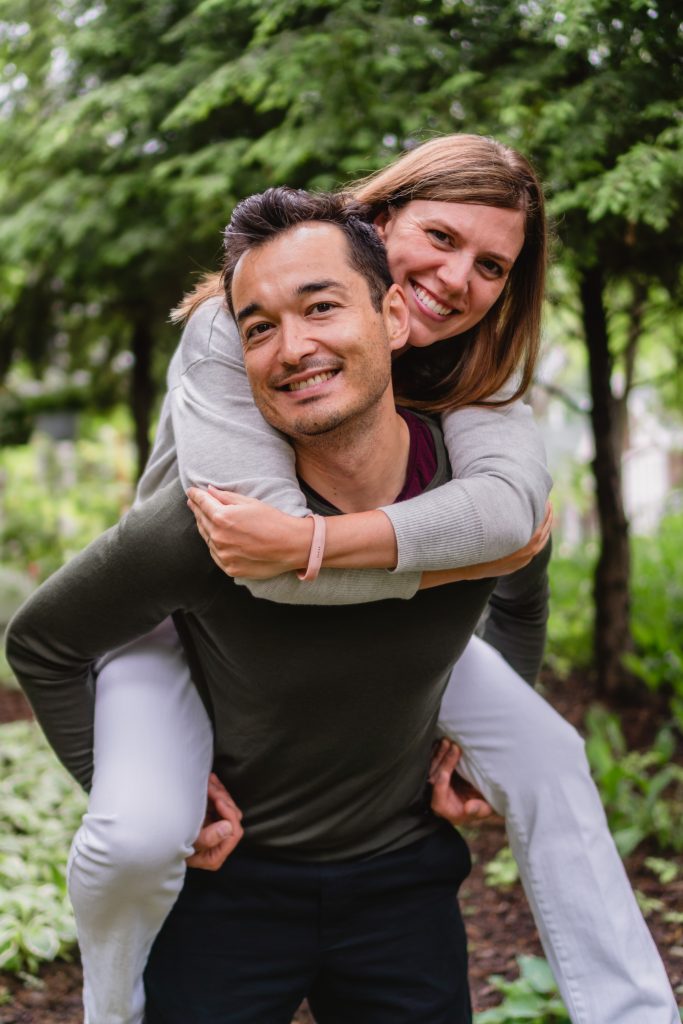
I met Rebecca in Chicago at the Cents Positive Retreat in 2019. One morning of the retreat, I hosted a breakfast discussion for people interested in learning about part-time work. Rebecca joined me.
We discussed the benefits and challenges of part-time work. It sounded like Rebecca and her husband were ready to make this a reality over the next couple of years.
At the end of the breakfast, I told her that I wanted to feature her in a Slow FI interview after she officially decided to make the leap.
So, here we are! Let’s get into the interview.
1. Tell me a little bit about you.
My husband, Ren, and I are a double-income/no kids family. We currently call the Midwest home.

I am much more of a “plan for the future” person, while my husband is a “live and enjoy today” person. We met in graduate school while working toward our PhDs in counseling psychology. We were fortunate to graduate with very little student loan debt (shout out to the graduate student employee union we were a part of, which allowed us to benefit from collective bargaining regarding tuition costs).
We are both practicing psychologists and between us have worked in a wide variety of clinical settings.
Most recently, we made the decision to leave salaried jobs and transition fully into part-time self-employment. We opened our own clinical practice encompassing therapy, professional training, and professional consultation services. Our practice is completely online, which allows us to work from anywhere as long as there is an internet connection and a private space to talk. This also allows us to slow travel in a manner that fits our values – both having time to experience the location while continuing to provide services.
2. What deliberate decision did you make to slow down and improve your life?
We decided to prioritize our quality of life and wellbeing over striving for professional & economic “success”.
For years, both my husband and I worked full-time, salaried jobs as clinicians in a large healthcare organization. We have since transitioned to self-employment in private practice and both work part-time hours.
When I first discovered FIRE, it seemed to be the answer to that whisper of discontent and worry that I would not be able to make it 30 years in my line of work. After my initial discovery, our spending and savings rate reflected my enthusiasm for FIRE!
As my husband and I talked about what we liked and didn’t like about our jobs, I came to realize that the issue wasn’t the work itself. Instead, I was actually concerned about whether the pace was sustainable long-term.
We had discussions about whether we would want to actually retire early or simply find a more flexible situation that would allow us to enjoy our work for decades to come. Early on I found myself advocating for FIRE as this would theoretically free up the most time to invest ourselves into meaningful personal relationships and experiences.
However, pursuing this path would require additional sacrifice in the short term in order to maximize years of full retirement.
We each had individual health scares (Ren in 2017 and me in 2019) that inspired us to take a step back, realize that “F-you”/”heck no” money gave us power, and consider part-time work.
In late 2017, my husband developed some unexplained health problems that led him to visit specialists and undergo a variety of invasive testing. It was a big wake-up call to me, recognizing that we were not young & invincible as I had always assumed and that time is precious. While he never got clarity on what the problem was, it became clear to us his issues were stress-related as his symptoms began to improve as we got rid of some of the stressors in our life.
This was followed by a medical diagnosis of my own in 2019, which just reinforced the notion that we only have this life to live and time is our most valuable resource.
As we reflected on all of this, we also realized that the work we do is very meaningful. As Ren will often say, being a therapist is not just a job – it is his vocation. It is an honor to be invited into someone’s inner world and bear witness to their growth and development over time.
Once we determined that working more years at a part-time pace would be sustainable, our target moved more toward semiretirement and part-time work. This pivot will both allow us to enjoy our work while creating more time for personal relationships and experiences of value.
3. How did your decision to pursue part-time self-employment impact your quality of life?
My husband’s decision to leave his full-time job and transition to part-time self-employment in July 2020 has been really wonderful for us. Rather than working 40+ hours a week spanning Monday through Friday, he now works about 3.5 days per week.
He has been able to invest time in hobbies and recreation that otherwise got shoved to weekends or evenings. Rather than living for the weekend, he is able to incorporate whatever he wants to do in his schedule throughout the week.

For example, if he wants to drive several hours away to go mountain biking on a Friday, he does. If he doesn’t want to work on a particular day, he simply doesn’t schedule any appointments. While he has always enjoyed his work as a psychologist, being his own boss and setting his own schedule makes the work more sustainable long-term.
I just left my full-time job in August 2021, so am still in the early stages of the adjustment but my quality of life has definitely improved. I never wake up to an alarm clock anymore unless it’s of my choosing! I run errands during the week when the roads and stores are less busy. I have the time to make all our meals from scratch and experiment with new plant-based recipes I have saved over time but never made.

Sundays are just another day of the week, not something I feel I need to wring every last drop out of. A lightness and enthusiasm have returned as I get to dedicate my time in any way that feels to best match my natural rhythms.
As Tanja Hester wrote in Work Optional, it’s important to think through how you want to spend and invest the time you’ve reclaimed from work before you quit. So, we’ve intentionally made plans to engage in activities of our choosing.
Ren spends a lot of time outdoors on his bike. I’ve tended to some food plants this year and have been trying new recipes. I have plans to learn a new language now that I have more time to consistently dedicate to the practice throughout the week.

We have a lot of exciting travel plans in what remains of 2021 and will be spending some quality time with loved ones we have been missing during COVID-19. From a wanderlust perspective, it has allowed us to dream of – and plan for – travels in a way that simply would not have been possible with salaried jobs accompanied by limited vacation days.
4. How did the decision to be part-time and self-employed impact your financial goals or timelines?
Ultimately, our goal of achieving financial freedom by pursuing FI has not changed. That being said, our decision to shift to part-time hours likely will bump out our timeline to full FI. We are expecting a decrease in income, at least initially.
We are unsure what our income numbers will look like from year to year moving forward. We also know there can be so much variability in the world of self-employment as different opportunities arise! It will be interesting to see, looking at our income numbers from the first few years, whether that FI target date bumps out or perhaps even moves forward!
Last year, we had about a 50% savings rate. This year, we are on track to save and invest roughly the same amount we did in 2020. We realize our savings rate will increase and decrease depending upon what our income looks like from year to year moving forward. The nice thing I have found about choosing this path, though, is that there is no longer pressure to hit our FI target as quickly as possible.

Our primary focus right now is on health and wellbeing more so than our FI timeline. Ren has been really good at reminding me that our human life timeline is the most important timeline. We, like many people, have come to realize there is no guarantee of a certain amount of time on this earth. For me, a shift in mindset that expands beyond just financial capital to include other forms of capital and wellbeing is something I try to keep in mind whenever I find myself overly concerned about money.
If at any point we do decide we want to fully retire early, we know how to increase income for a bit and sock away even more money in our brokerage account to draw down until we hit retirement age and can access our retirement accounts and deferred pensions.
5. What enabled you to transition to part-time self-employment?
Several circumstances made part-time self-employment an option for us.
First, early in our FI journey, we were intentional about prioritizing paying off the debt we carried and have remained committed not to take on new debt. At this point, we have no debt beyond our mortgage. Thus, there is extra breathing room, so to speak, without having an urgency to make a certain amount of money per month to meet payment obligations.
Second, we have always lived below our means and had the security of savings to make a dream a reality and opt-out of a salaried paycheck. This means that given our spending rate, we can live comfortably and work part-time.
Third, we both have the privilege of having advanced degrees and working in an occupation that generally pays well. We work in an occupation that currently has a labor shortage, so if self-employment for some reason ends up not working the way we want, we know one or both of us can go out and get a salaried job relatively easily should it feel necessary.
All of these factors helped me personally confront the anxiety thoughts of “what if [fill in the blank catastrophe] happens” with facts/data and provided a boost of confidence to take the leap.
6. Were there things in your life you adapted so you could continue to work toward your goals?
Personally, what needed to shift and adapt most after our decision to pursue Slow FI vs FIRE were sticky, long-standing beliefs about work, money, and “success”. I needed to challenge my thinking that with each year in the field, I should be earning more money.
Another sticking point was the perspective that each year’s saving rate needed to meet or exceed the prior year. As the “money person” in our relationship, I know all of these numbers and have tracked them for years, so it’s taken an effort to become more flexible in this area.
Practicing what I help others with – challenging all/nothing thinking, meeting myself with compassion, etc. – in these areas will continue to be essential!
In the realm of finances, one thing we really did not understand going into creating our own business – but has been a really nice realization – is how much of our spending is considered business expenses (which helps decrease taxable income). Things we had always paid for personally before (professional licenses, continuing education, etc.) now come out of our business earnings, which is really nice!
I also immediately set up a solo 401(k) plan so we can keep saving/investing for our traditional retirement years. And finally, as we transition to buying our own health insurance through the exchange in our state we have the opportunity to open Health Savings Accounts which are really good vehicles for tax optimization. All of these choices allow us to continue enjoying life now with a sense of security for our current and future selves.
7. How did your pursuit of FI help or hinder your decision to pursue part-time self-employment?
Our pursuit of financial independence absolutely laid the groundwork for our current decisions. I first read Your Money or Your Life in 2018, which sparked conversations about what our “enough” is and how money is a tool that can be used to buy freedom.
This was followed by a deep dive into a large spectrum of FI/RE-related content through blogs, podcasts, and books. This allowed me to share what I was learning with my husband and fostered discussion about how pursuing FI would open our life up to more possibilities.
To be honest, he wasn’t fully on board the first year or so. The idea of full early retirement didn’t sound appealing to him. Nevertheless, he was fine with increasing our savings rate and building an “F-you”/”heck no” buffer. These intentional financial decisions came in very handy when he hit burnout at work in late 2019 and decided something needed to change.
8. Why and when do you think someone might consider “downshifting?
If your circumstances no longer seem sustainable or you are no longer okay with putting off the life you wish to live, downshifting is a great option to consider.
Having a long, healthy life is not guaranteed. Chronic stress is not good for the body or brain. If you want to live a healthy and fulfilling life and have the ability to pull back, downshifting could be a very tantalizing possibility.
Additionally, life circumstances and personal values change over time. You may consider downshifting if you have entered a new chapter of life and there are other areas they wish to prioritize beyond that next marker of job ‘success’.
9. What advice do you have for someone considering a similar decision?
Be thoughtful and intentional in your planning. Sometimes we’re privileged enough to be in a position where we can choose how and when we downshift. Other times that choice is forced upon us (layoffs, illness, etc.). Do not assume you’ll always have the security of a full-time salaried position.
There may come a day where you need to leave that job or that job leaves you. Following the core tenets of financial independence – avoid debt, spend less than you earn, save and invest the rest – will provide the security to dream of other possibilities and take the risks to make those dreams a reality whether that is in the next one, five, or ten years down the road.
Thank you, Rebecca, for sharing your story with us!
The main thing that I want to call out from this interview is that both Rebecca and Ren found meaning from their work, but they also found it stressful and depleting.
Originally, Rebecca worried that it wouldn’t be sustainable to continue working full-time for 30 years. So, her original response was to push toward early retirement.
After experiencing health issues, Ren and Rebecca realized that financial freedom wasn’t all or nothing. The financial timeline wasn’t the most important thing.
By reducing their hours and working part-time, they were able to find a structure that would allow them to:
- Maximize the enjoyment they got from their work, and
- Enhance the enjoyment they got from their life because they also got to focus on what was important to them outside of work (health, relationships, fun, etc.).
If you are enjoying your life, why would you need to sprint toward the FI finish line?
I absolutely love this perspective! I currently love my work, and I do about 30 hours/week. This works for me, especially since Corey still works full-time. Over the next few years, I hope to scale back the amount of time I work each year. After Corey quits his job, working less will allow us to focus on travel and adventure.
Would you enjoy your work more if you had a better balance where you could focus on what’s most important to you?
Rebecca and Ren have a minimal presence on social media and don’t document their financial journey online. However, if you have any questions for Rebecca, you can email her at rebeccastinson (at) summergoldcounseling.com.
























